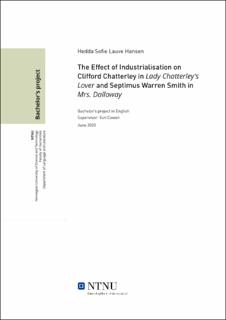| dc.contributor.advisor | Cowan, Yuri. | |
| dc.contributor.author | Hansen, Hedda Sofie Lauve. | |
| dc.date.accessioned | 2020-08-08T16:00:46Z | |
| dc.date.available | 2020-08-08T16:00:46Z | |
| dc.date.issued | 2020 | |
| dc.identifier.uri | https://hdl.handle.net/11250/2671237 | |
| dc.description.abstract | De kvinnelige karakterene i D. H. Lawrence's Lady Chatterleys Lover og Virginia Woolfs Mrs. Dalloway er generelt foretrukket for analyse enn de mannlige karakterne Clifford Chatterley og Septimus Warren Smith. Rollene deres har blitt marginalisert til tross for at de har mye å si for hvordan fremveksten av det industrialiserte samfunnet og hvordan dette påvirket det mannlige selvbildet. Både Clifford og Septimus sine kropper og sinn blir forvandlet fra krigsoffer til offer for industrialisering. Mens Septimus avviser den stoiske maskuliniteten i etterkrigstidens samfunn, er Clifford i samsvar med den i sin søken etter økonomisk suksess. Årsaken til at begge disse karakterene reagerer ulikt mot industrialisering, er på grunn av deres grunnleggende holdinger overfor industrialisering: Septimus ser på fremveksten av industrialiseringen som en sykdom overfor samfunnet, mens Clifford ser det som en mulighet til å tjene penger på teknologiske fremskritt. Deres forskjellige tilnærminger til industrialisering er et direkte resultatet av verdiene de hadde før krigen. Begge ender likevel opp som ofre for industrialisering. Begge romanene tar med dette en kritisk stilling til tilnærmingen til industrialisering og måten den påvirker den mannlige kroppen og sinnet. | |
| dc.description.abstract | The female narratives in D. H. Lawrence’s Lady Chatterley’s Lover and Virginia Woolf’s Mrs. Dalloway tend to be favoured for analysis over the male narratives of Clifford Chatterley and Septimus Warren Smith. Their narratives have been marginalised despite having a lot to say about the way in which the rise of industrialised society has affected the male self-image. Clifford’s mind and body are transformed from victim of war to victim of industrialisation; the same goes for Septimus. Whereas Septimus rejects the stoic masculinity of post-war society, Clifford conforms to it in his pursuit of economic success. The reason why both of these characters react differently towards industrialisation, is because of their prerequisite mindsets: Septimus views the rise of industrialisation as a sickness to society; Clifford sees it as an opportunity to capitalise on the technological advancements of the time. Their different approaches to industrialisation are the direct result of their mindsets before war. However, both end up losing their sense of self and wind up as victims of industrialisation. In this light, both novels take a critical stand to the approach to industrialisation and the way in which it affects the male body and mind. | |
| dc.publisher | NTNU | |
| dc.title | The Effect of Industrialisation on Clifford Chatterley in Lady Chatterley's Lover and Septimus Warren Smith in Mrs Dalloway | |
| dc.type | Bachelor thesis | |
